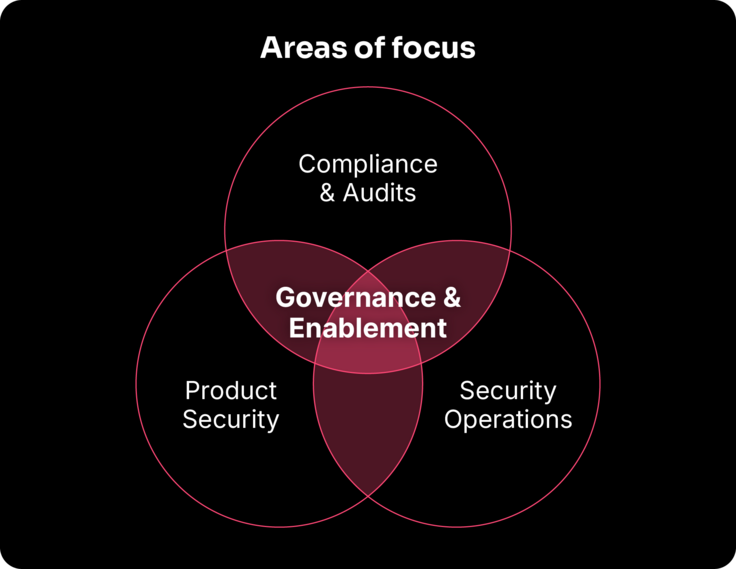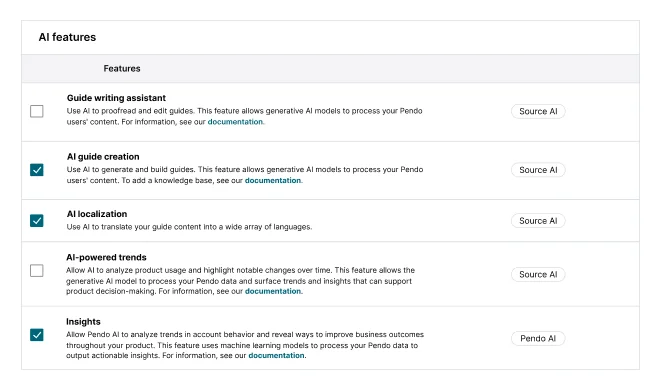Table des matières
What is SaaS security?
SaaS security refers to the measures, policies, and technologies used to protect data, applications, and users within cloud-delivered software environments.
As organizations adopt software-as-a-service (SaaS) platforms to run critical operations, the need for robust security becomes paramount. Effective SaaS security ensures that data is protected both in transit and at rest, user access is appropriately managed, and compliance standards are consistently met.
AI introduces new considerations that reshape SaaS security. Incorporating AI into workflows means security measures must extend beyond traditional safeguards to include controls for data isolation, human oversight, AI model governance, and ethical use of ML systems.
Why is SaaS security important?
Enterprises today are cloud-first—relying on SaaS tools for everything from customer engagement to internal collaboration. This shift means sensitive data no longer resides solely behind corporate firewalls, increasing exposure to risk.
Security is also driven by compliance with regulations like SOC 2, GDPR, CCPA, and HIPAA, which mandate strong data protection practices.
AI adoption introduces new risks:
- Data leakage: Models may inadvertently expose sensitive inputs.
- Model misuse: Malicious prompts or unapproved use cases.
- Ethical concerns: Bias, transparency, and accountability challenges.
- Lack of AI model governance: Without oversight, AI systems may deviate from expected behavior.
- Shadow AI: Unauthorized AI usage by employees increases risk.
These factors make SaaS security a mission-critical concern for any modern enterprise.
How does SaaS security work?
SaaS providers implement multi-layered security approaches, combining traditional IT safeguards with AI-specific controls:
- Encryption: TLS 1.3 for data in transit; AES-256 for data at rest.
- Access management: Multi-factor authentication (MFA), role-based access control (RBAC), and least-privilege principles.
- Monitoring & response: Intrusion detection, vulnerability scanning, penetration testing.
- Compliance programs: SOC 2, HIPAA, ISO certifications.
- AI governance: Human-in-the-loop AI, opt-in/opt-out AI feature design, model transparency, data isolation.
By embedding AI governance directly into the SaaS stack, organizations mitigate risks while retaining the innovation benefits AI offers.
What are the key pillars of an effective SaaS security program in the age of AI?
An effective SaaS security program sits at the intersection of several key pillars:

Within this framework, Pendo emphasizes the following elements:
Data protection involves securing customer data at every stage through end-to-end encryption. Pendo utilizes TLS 1.3 for encrypting data in transit and AES-256 for encrypting data at rest, ensuring data remains confidential and secure throughout its lifecycle.
Identity and access management at Pendo incorporates multi-factor authentication (MFA), role-based access control (RBAC), and least-privilege principles. These mechanisms ensure that only authorized individuals have access to sensitive systems and data.
Monitoring and incident response are essential components of Pendo’s security posture. With intrusion detection systems (IDS), continuous monitoring, penetration testing, and a bug bounty program, Pendo proactively identifies and addresses potential vulnerabilities.
Compliance and certifications reflect Pendo’s commitment to regulatory alignment. Pendo maintains SOC 2, HIPAA, GDPR, CCPA, and ISO 27001/42001 certifications, providing assurance to customers operating in regulated industries.
Privacy by design is a foundational principle for Pendo. Data collection is minimized, AI features are clearly explained, and all AI functionality is disabled by default unless explicitly enabled by the customer, giving users complete control over how their data is used.
AI security and governance is central to Pendo's responsible AI strategy.
AI data isolation ensures that each customer's data is kept separate and secure during model training and inference. This strict boundary prevents cross-contamination and reinforces data privacy and compliance.
Human-in-the-loop oversight is built into every AI interaction. Pendo customers retain control to approve, reject, or edit AI outputs before use, ensuring trust and accountability.
AI model governance includes structured processes for model design, development, and validation. These controls help ensure the performance, accuracy, and compliance of every deployed model.
AI risk management frameworks proactively assess and mitigate risks across the AI lifecycle. This includes legal, ethical, operational, and reputational dimensions, especially in regulated industries.
Opt-in/opt-out controls empower customers to decide exactly how and when AI features are activated. This puts organizations in full control, supporting enterprise-level risk and compliance policies.
How does Pendo approach SaaS and AI security?
Pendo maintains a security-first culture, driven by its Chief Information Security Officer (CISO) and specialized security teams across SecOps, Product Security, and Compliance.
AI-specific safeguards
Human-in-the-loop validation ensures that every AI-generated output is subject to human review before it is published or acted upon. This validation layer promotes accountability, reduces risk, and supports user confidence in AI-powered outcomes.
Customer-specific models are designed to operate in isolated environments, ensuring that each customer’s data remains strictly segregated during both training and inference. This AI data isolation model eliminates the possibility of cross-customer data exposure, preserving privacy and compliance.
Opt-in/opt-out AI features offer complete autonomy to the user organization. By keeping AI functionality off by default and requiring explicit enablement, Pendo lets customers control engagement based on their risk tolerance and regulatory requirements.
Ethical AI governance is embedded throughout the AI development lifecycle at Pendo. From initial design to deployment, ethical considerations such as fairness, accountability, and transparency are systematically applied to ensure responsible innovation.
Pendo aligns its AI practices with enterprise security expectations, delivering value without sacrificing trust.
How has AI changed the SaaS security landscape?
AI expands the SaaS attack surface across four core areas:
- Data leakage: LLMs may inadvertently surface sensitive data.
- Shadow AI: Untracked AI usage introduces compliance gaps.
- Lack of AI transparency: Customers may not fully understand how models operate.
- Governance gaps: Without controls, AI can introduce bias or regulatory risk.
What’s Pendo’s approach to tackling these challenges?
Pendo addresses these challenges through a multi-pronged strategy designed to embed trust and oversight into every layer of our AI offering.
A human-in-the-loop AI design ensures that users remain in control of AI-generated outputs. Pendo empowers customers to review, accept, modify, or reject suggestions—maintaining accountability and reducing the risk of unverified actions.
Transparent AI disclosures are embedded throughout our documentation and in-product messaging. We clearly communicate where AI is being used, how it functions, and what data it interacts with, enabling informed customer decisions.
Customer-level opt-in/opt-out configurations give users the final say in whether AI features are enabled. This ensures that AI usage aligns with internal policies, industry regulations, and specific risk tolerances.
Governance policies aligned with ISO 42001 guide how Pendo builds, deploys, and monitors AI features. These frameworks ensure ethical design, traceability, and regulatory compliance throughout the AI lifecycle.
Other common questions about SaaS and AI security
Is SaaS security different from traditional IT security?
Yes. SaaS security is designed to address cloud-native environments where data resides in shared infrastructure and users access applications via the internet. Traditional IT security, by contrast, is centered on on-premise controls and perimeter-based defenses.
How does AI impact SaaS security?
AI brings new risks that must be accounted for, such as data leakage through model outputs, bias in predictions, and potential misuse of automation. These threats require new governance layers—like ethical AI frameworks and real-time monitoring—to ensure safe deployment.
What certifications should I look for in a SaaS provider?
You should look for industry-recognized certifications such as SOC 2, HIPAA, GDPR, CCPA, and ISO 27001 or ISO 42001. These demonstrate that the provider has established and independently validated security, privacy, and compliance controls.
Does Pendo comply with SOC 2 and HIPAA?
Yes. Pendo undergoes regular third-party audits to maintain SOC 2 compliance and meets the controls necessary to support HIPAA-regulated customers, including data encryption, access controls, and breach response protocols.
Does Pendo train AI models on my data?
No. Pendo never uses customer data to train third-party models or global models. Instead, models are isolated at the tenant level to ensure strict data separation and compliance.
Can I disable AI features in Pendo?
Absolutely. All AI capabilities are disabled by default and require customer opt-in. This ensures full control over when and how AI is used in your product environment.
What is human-in-the-loop AI?
Human-in-the-loop (HITL) AI refers to a system where AI-generated outputs are reviewed or edited by a human before being accepted. Pendo uses this approach to ensure AI enhances rather than overrides human judgment, preserving accountability and trust.
What are some additional resources that cover Pendo’s approach to security, privacy, and compliance?
These resources provide deeper insights into how Pendo ensures a secure, compliant, and trustworthy SaaS experience—powered responsibly by AI. Keep learning:


